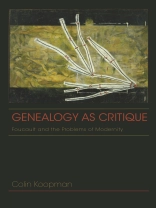Viewing Foucault in the light of work by Continental and American philosophers, most notably Nietzsche, Habermas, Deleuze, Richard Rorty, Bernard Williams, and Ian Hacking, Genealogy as Critique shows that philosophical genealogy involves not only the critique of modernity but also its transformation. Colin Koopman engages genealogy as a philosophical tradition and a method for understanding the complex histories of our present social and cultural conditions. He explains how our understanding of Foucault can benefit from productive dialogue with philosophical allies to push Foucaultian genealogy a step further and elaborate a means of addressing our most intractable contemporary problems.
Tabella dei contenuti
Acknowledgments
Introduction: What Genealogy Does
1. Critical Historiography: Politics, Philosophy & Problematization
2. Three Uses of Genealogy: Subversion, Vindication & Problematization
3. What Problematization Is: Contingency, Complexity & Critique
4. What Problematization Does: Aims, Sources & Implications
5. Foucault’s Problematization of Modernity: The Reciprocal Incompatibility of Discipline and Liberation
6. Foucault’s Reconstruction of Modern Moralities: An Ethics of Self-Transformation
7. Problematization plus Reconstruction: Genealogy, Pragmatism & Critical Theory
Notes
Bibliography
Index
Circa l’autore
Colin Koopman is Assistant Professor of Philosophy at the University of Oregon and author of Pragmatism as Transition: Historicity and Hope in James, Dewey, and Rorty.












